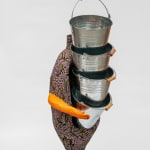Xanthe Somers Zimbabwe, b. 1992
Labour or Love II, 2024
Glazed stoneware, wax fabric, hand built
H 130 x W 50 x D 55 cm
GRXS026
Photo: Deniz Güzel
Further images
-
(View a larger image of thumbnail 1
)

-
(View a larger image of thumbnail 2
)

-
(View a larger image of thumbnail 3
)

-
(View a larger image of thumbnail 4
)

-
(View a larger image of thumbnail 5
)

-
(View a larger image of thumbnail 6
)

-
(View a larger image of thumbnail 7
)

-
(View a larger image of thumbnail 8
)

-
(View a larger image of thumbnail 9
)

-
(View a larger image of thumbnail 10
)

The works 'Labour or Love I' and 'Labour or Love II' take inspiration from Françoise Vergès' seminal essay “Capitalocene, Waste, Race and Gender”, published in 2019 in e-flux journal. In...
The works "Labour or Love I" and "Labour or Love II" take inspiration from Françoise Vergès' seminal essay “Capitalocene, Waste, Race and Gender”, published in 2019 in e-flux journal. In this text, the decolonial political theorist critiques the Anthropocene concept, which holds humanity at large responsible for the ecological crisis. Vergès instead advocates for the term “Capitalocene”, highlighting how capitalist, colonial, and racist systems have driven environmental destruction. Vergès draws attention to the intersections between waste production and the exploitation of racialized communities and women, particularly in the Global South, who bear the brunt of ecological degradation while being sidelined in global solutions.
In “Labour or Love I” and “Labour or Love II” Xanthe Somers critically explores these themes, asking, Who cleans the world? The works evoke the parallels between the over-exploitation of labor and the exhaustion of natural resources, reflecting on extractive economies and notions of domesticity in a post-colonial framework. Somers particularly interrogates the roles of care and cleanliness within these dynamics, emphasizing the often invisible labor behind maintaining both people and environments.
In “Labour or Love I” and “Labour or Love II” Xanthe Somers critically explores these themes, asking, Who cleans the world? The works evoke the parallels between the over-exploitation of labor and the exhaustion of natural resources, reflecting on extractive economies and notions of domesticity in a post-colonial framework. Somers particularly interrogates the roles of care and cleanliness within these dynamics, emphasizing the often invisible labor behind maintaining both people and environments.










